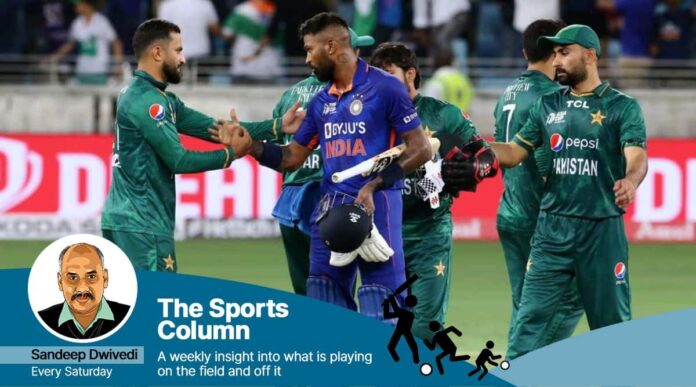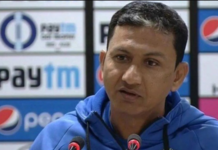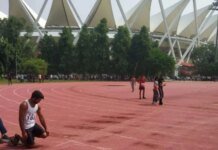It was during those chaotic months before the 2010 Commonwealth Games, that the then Sports Minister MS Gill made a statement that till date offers respite to all sports administrators fighting deadlines in run-up to high-profile events. Tired of answering questions about the unfinished stadiums and umpteen organisations snafus, the bureaucrat turned parliamentarian made a prophecy that more or less came true.
“Never mind the delays. Like a seemingly disorganised arrangement in an Indian marriage – just like in the movie ‘Monsoon Wedding’ – we will have a grand Games,” Gill had said.
Like the Delhi CWG 2010, India gets ready for another October wedding and not everything is going according to plan. Cricket’s oldest and biggest rock show, the 50 overs World Cup, is barely two months away but the fans still wait for the final modified schedule. While coming to terms with the flight cancellation losses, they keep their fingers crossed to deal with the suspense over match-day ticket sales.
The game at the centre of his uncertainty is the India-Pakistan league clash that has been slated for October 15, the day Gujarat gets into a 9-day garba frenzy to celebrate Navratri.
Unofficially, the reason for the expected date-shift is the potential security stretch but BCCI secretary Jay Shah has insisted that it is because of ‘requests of change’ floated by other boards. Whatever be the truth, there are a couple of questions that beg to be answered: Didn’t the schedule makers refer to the panchangam that lists Hindu festivals? Wasn’t the itinerary cleared by all participating nations before the ICC made it public?
World Cup veteran
Like in Monsoon Wedding, this ‘delay’ is the drizzle that is causing inconvenience but wouldn’t come in the way of watering down the excitement of a World Cup that will be played in a stadium packed by the game’s most passionate fans.
When it comes to hosting, the BCCI is a World Cup veteran. Back in 1987, even without the present day riches or infrastructure, they put up a show that’s mostly remembered for spectacular cricketing action.
For an institution that annually organises a 10-team ‘home and away’ IPL, it has enough people on board who know the drill. Right down to the groundsman, bus driver, turnstile operator, parking attendant, they know the match-day routine. However, the World Cup is no MI vs Titans clash, and the India-Pak game at Ahmedabad will test the organisers, security agencies, hotel staff and, of course, the fans.
Long before ICC announced the schedule, Ahmedabad was seen with suspicion. When the news broke that the world’s biggest stadium, the Narendra Modi stadium, was likely to host cricket’s famous battle of the neighbours, Pakistan upped their ante.
Speaking to The Indian Express, the then PCB chief Najam Sethi said: “When I heard this statement, I smiled and said to myself – ‘this is one way to make sure we don’t come to India’ … I don’t want to go into the politics of it but certainly there seems to be a political angle to this because if there’s one city where we might have security issues, it is Ahmedabad … This is a red herring being thrown in our way to tell us – ‘hey, we are going to play you in Ahmedabad and you watch out’.”
By the time the schedule was announced, Pakistan warmed up to the idea of playing at Modi stadium. Their former players asked PCB to not push for a change. Now the onus is on Ahmedabad to behave their best. Indian fans haven’t taken a World Cup loss in a crucial game too kindly. Images of Vinod Kambli in tears and the Eden Gardens in flames, after the surprising 1996 World Cup semi-final, are a reminder of Indian cricket’s embarrassing past.
For most of that March, the country’s collective dream of winning the Cup had grown. That was until Aravinda de Silva started treating Anil Kumble like a club bowler. s who gave a standing ovation to the Wasim Akram-led team after the 1999 Test that Pakistan won.
Chances are Ahmedabad will see fans in Pakistan green waving their country’s flags from the stands. If the long-standing tradition of Indo-Pak games is followed at the venue, they need to worry about their safety. The countries might have seen a bitter partition but the cricket fans of the two nations have coexisted peacefully in the stands. There is rigorous flag-waving, sometimes even finger wagging, but there is rarely any further transgression.
In his book ‘My years in BCCI’, the Indian cricket’s seasoned administrator, Professor Ratnakar Shetty, has a chapter about India’s historic 2004 tour to Pakistan. It’s here he describes the heart-warming scene after India’s close one-day series win in Lahore.
“The scenes we witnessed after the game were to be seen to be believed. Imagine Indians waving the tricolour and dancing to the beat of drums being played by Pakistanis, on the streets of Lahore! Unbelievable, but then, that is exactly what happened that night.” Ahmedabad will have a tough act to follow.
Peak of cricket diplomacy
It was a tour that was high on cricket diplomacy with premiers of both nations asking their cricketers to be ambassadors of peace. Indian PM Atal Bihari Vajpayee would invite the team to his home before they boarded the flight to fly across the border. Vajpayee would give the team a bat with ‘Khel bhi jeeto aur dil bhi’ written on it. And just when the team was leaving, the poet PM would float a request to the naval band to play ‘‘Hum honge kaamyaab’.
Shetty also gives juicy details of the evening in Pakistan when President Musharraf hosted the teams for tea. “He was in a jovial mood as he interacted with the players of both sides and cracked jokes, some at the expense of the Pakistani team. He described the lavish spread of food, which was rich in ghee, as ‘weapons of mass destruction’,” wrote Shetty.
Ahmedabad needs to remember that when India meets Pakistan on a cricket field, hostile neighbours talk of peace and even Generals take a break from wars and use lethal war instruments to break ice.
There is also an endearing snippet in Shetty’s book that sums up the love-hate relationship of the nation with shared history. It is from Pakistan’s reciprocal tour to India when the BCCI president Sharad Pawar invited the Pakistan team to his residence for dinner. Pawar was thoughtful to add India’s leading industrialist and Mohammad Ali Jinnah’s grandson Nusli Wadia to the guest list.
Shetty writes: “We hosted a dinner for both the teams at Mr Pawar’s official residence in New Delhi. Nusli Wadia, Jinnah’s grandson, was one of the invitees. The Pakistan squad waited till he arrived and each member of the team knelt before him and kissed his hand as a mark of respect.”
This is why, despite wars and failed dialogues, the fragile Indo-Pak hyphen refuses to be snapped. Ahmedabad has a chance to change perceptions. If they try they can discover a connect with the city. On the way to the stadium, the Pakistan team is likely to travel on the road that has the Ashram set by the Mahatma, who was most pained by the partition of 1947.
Send your feedback to sandydwivedi@gmail.com
.








